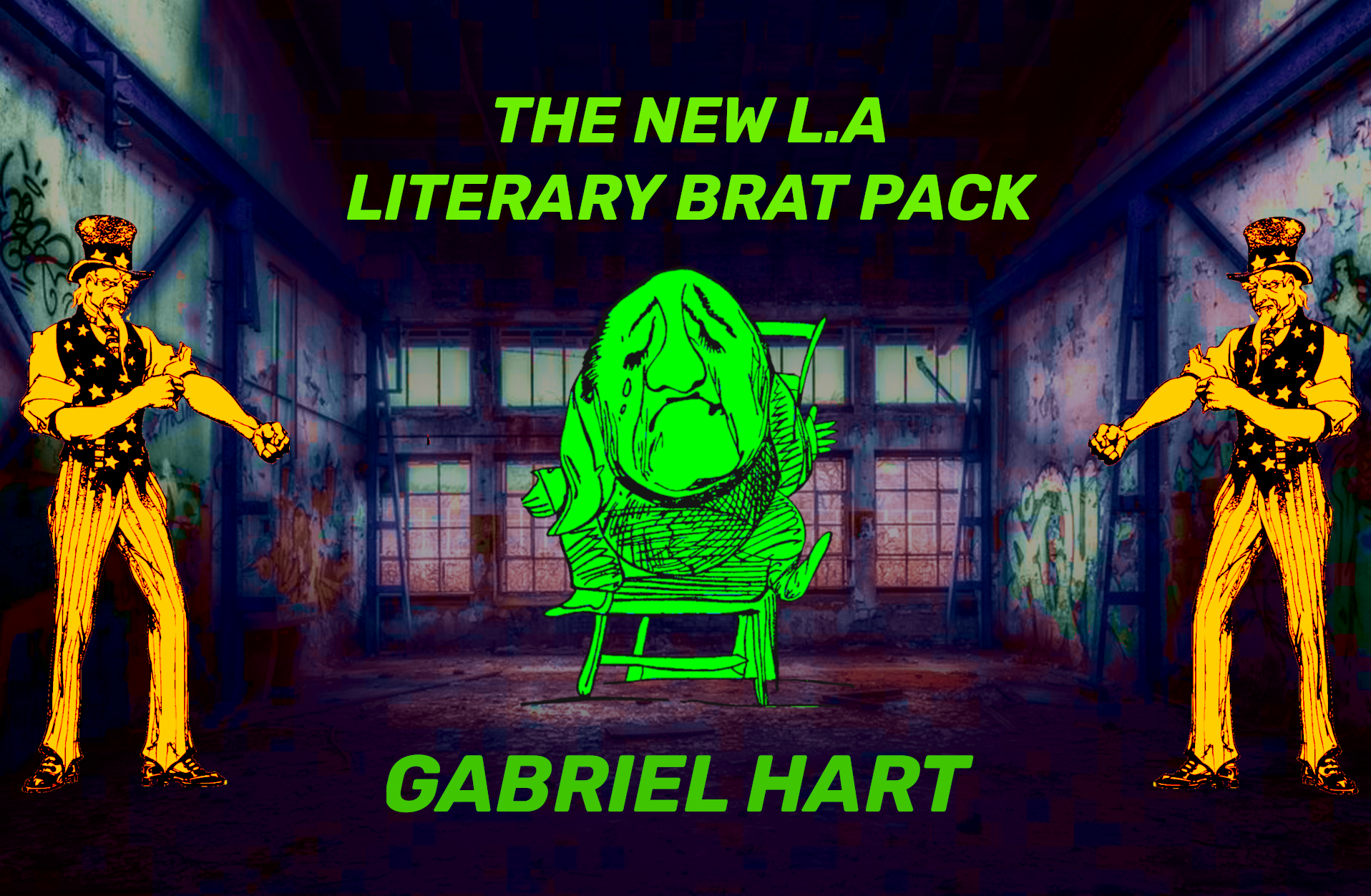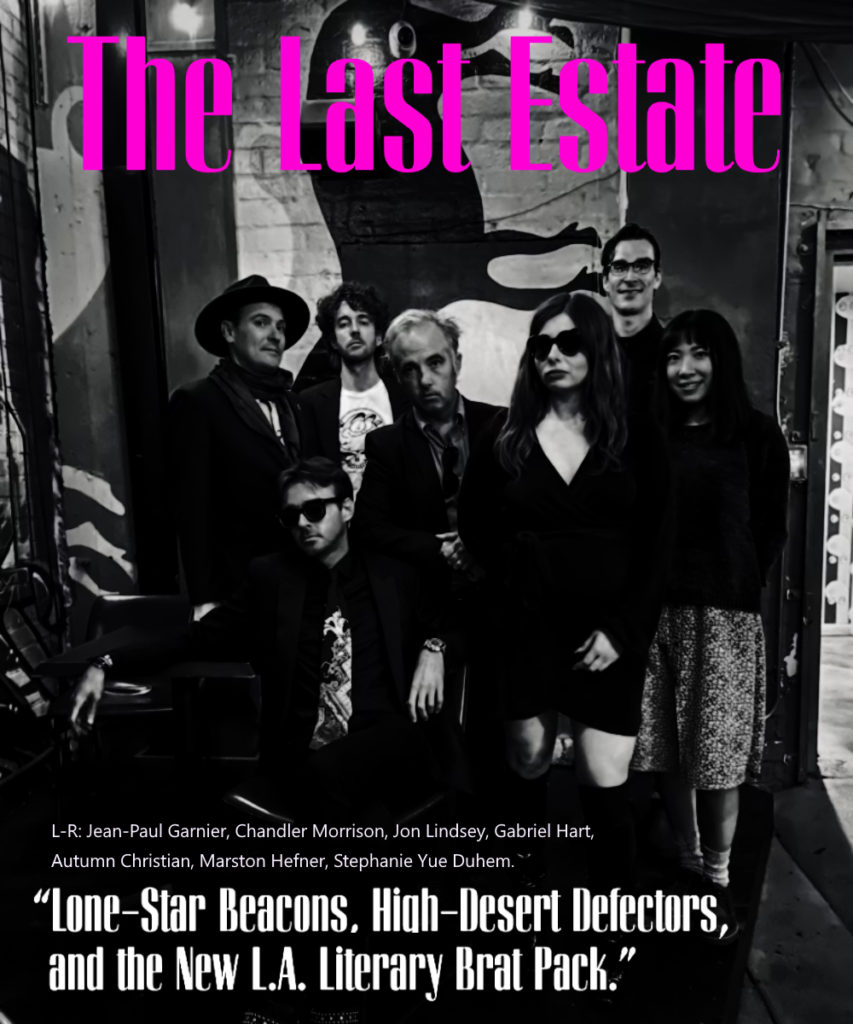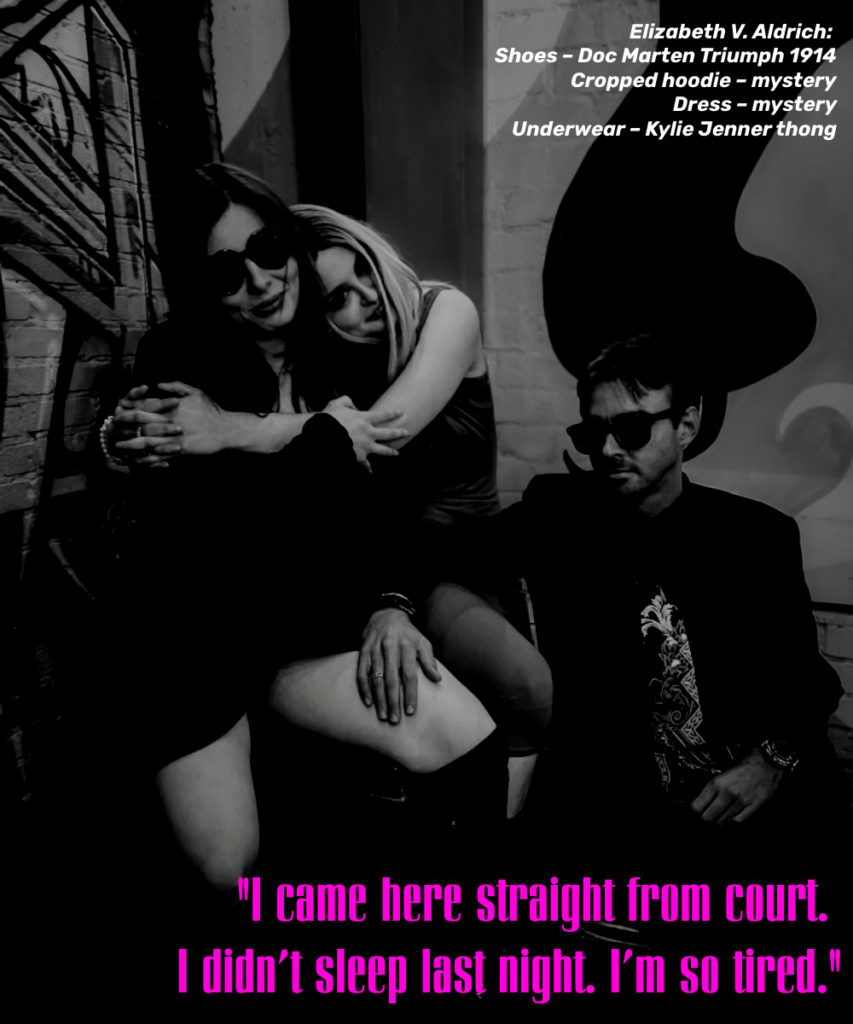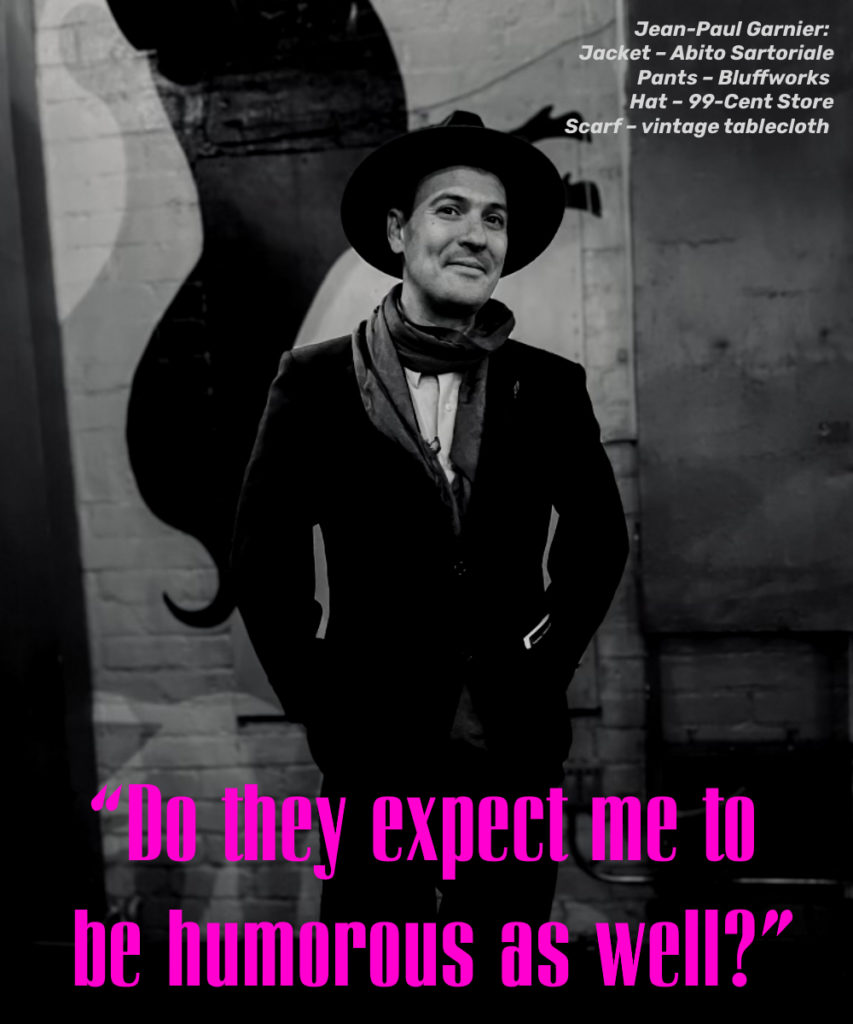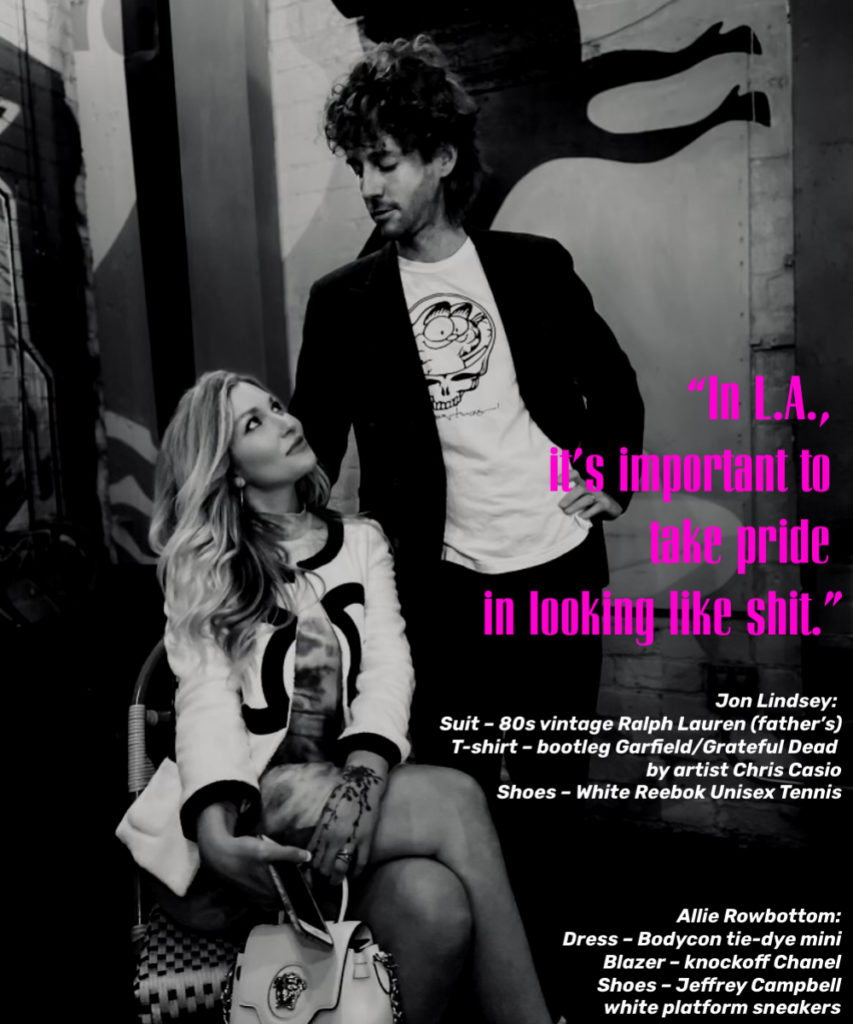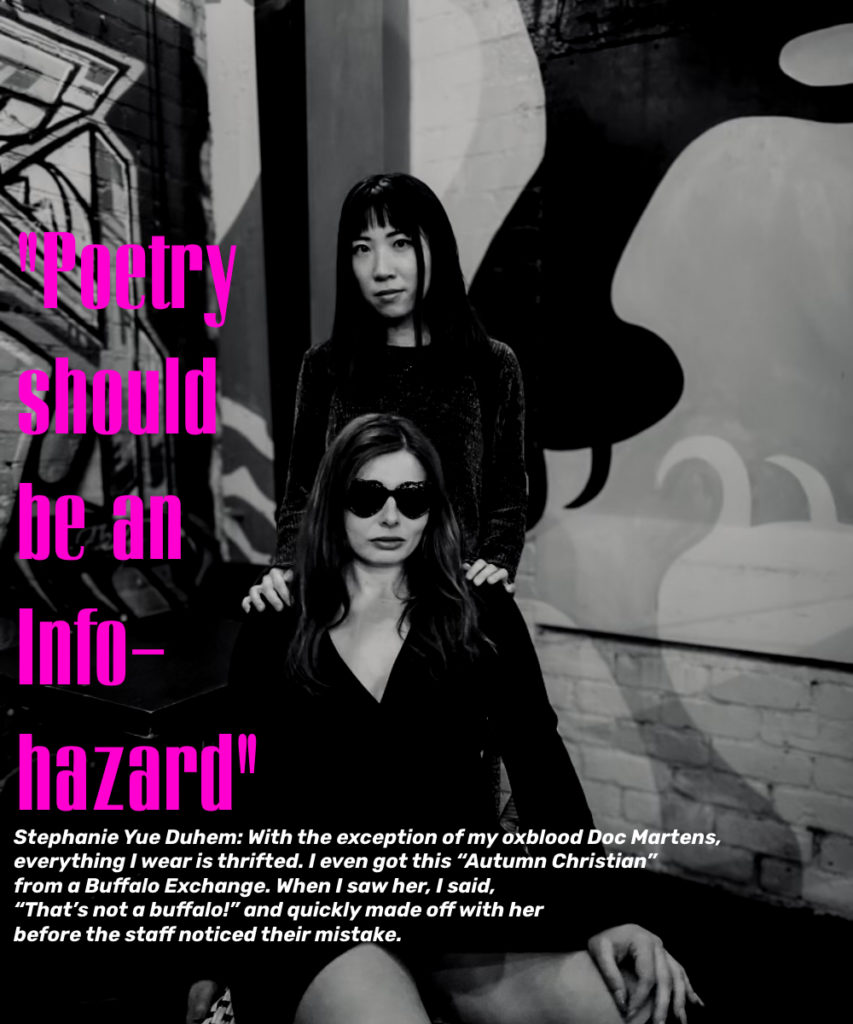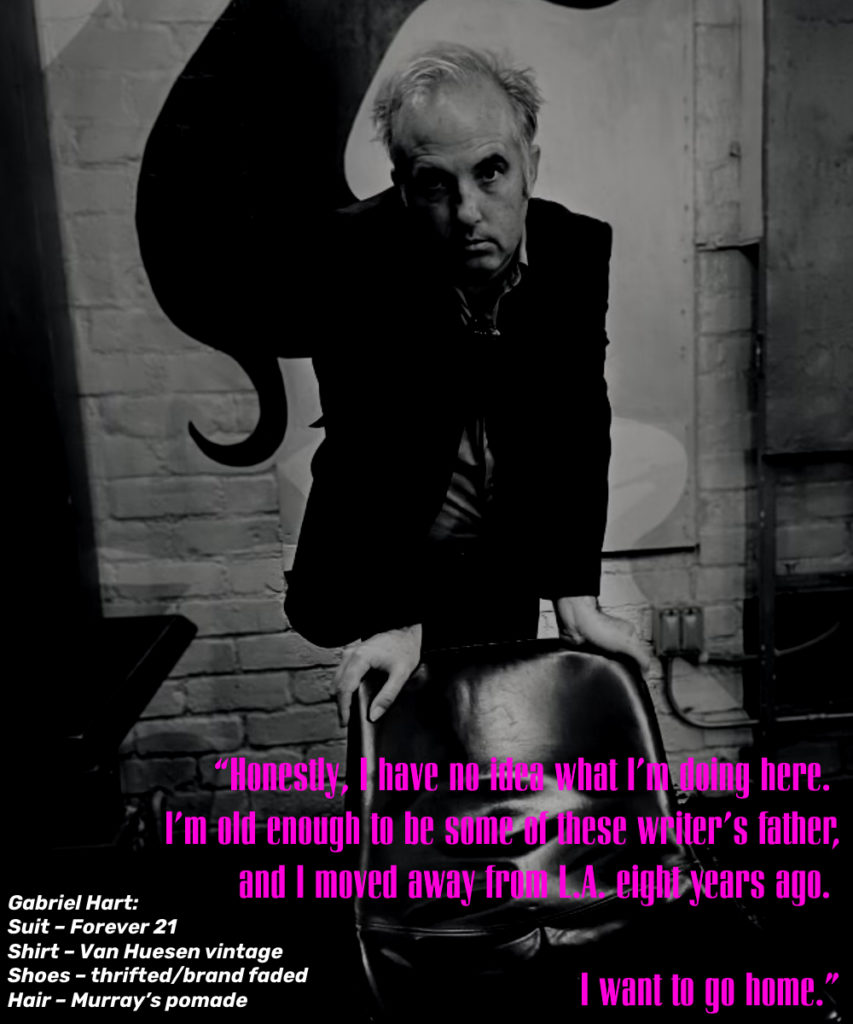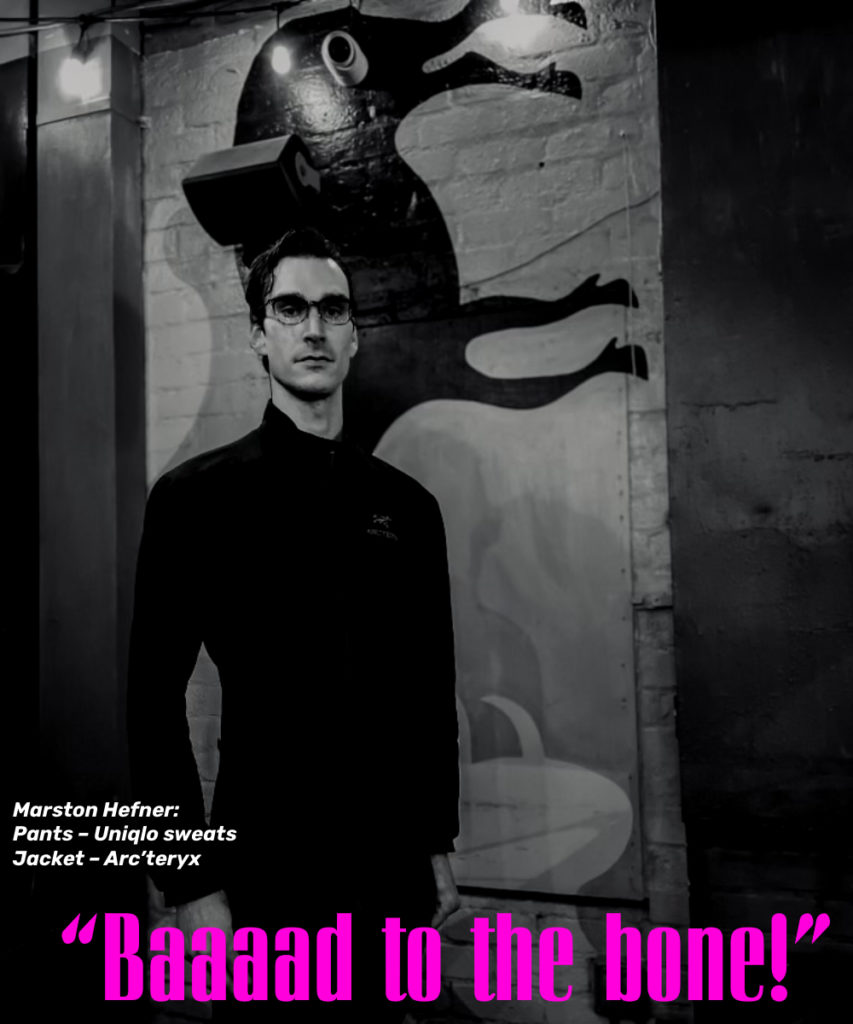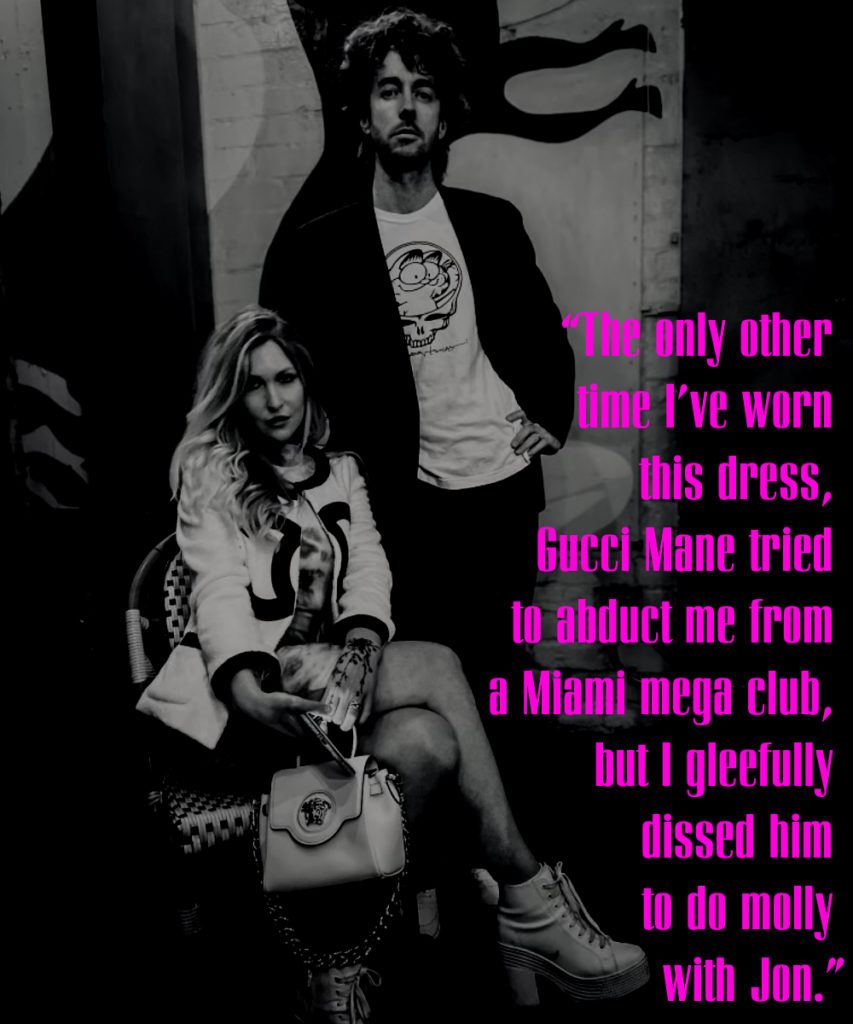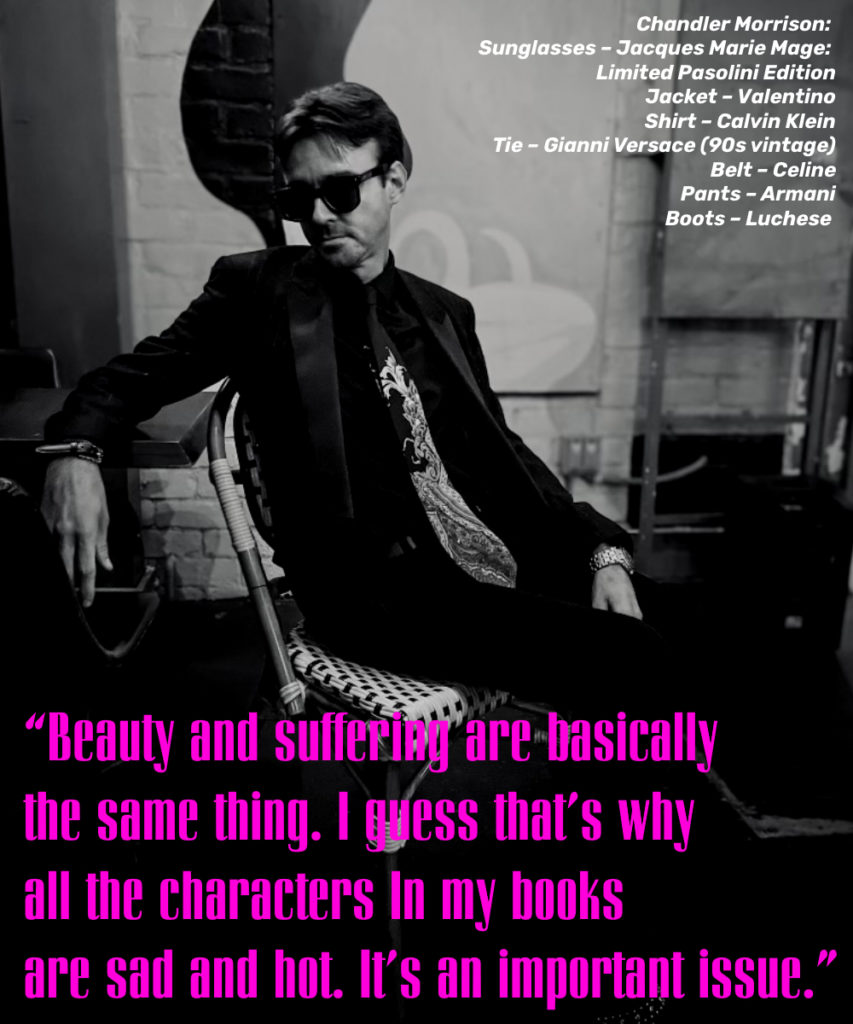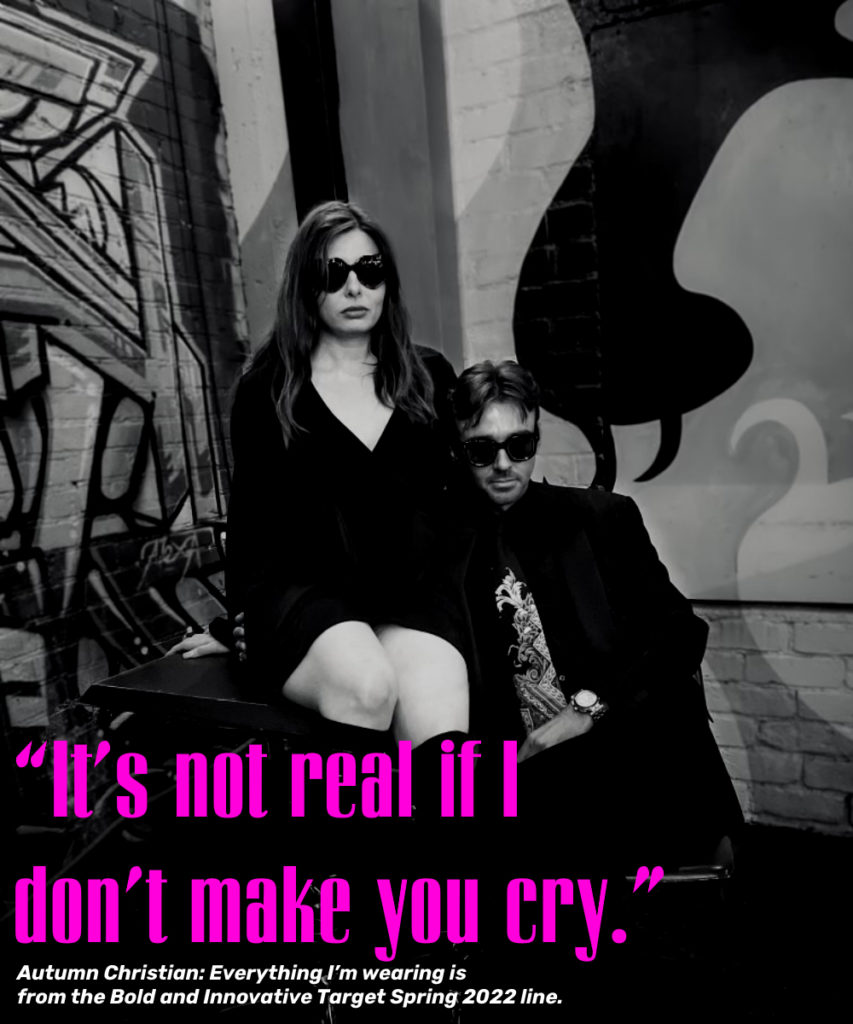LONE STAR BEACONS, HIGH DESERT DEFECTORS, AND THE NEW L.A. BRAT PACK
All photographs by Liz McGrane.
LONE STAR BEACONS,
HIGH DESERT DEFECTORS,
AND THE NEW L.A. BRAT PACK.
One reason I moved to The Last Estate was to write exactly what I want, at my own pace; no one telling me what to do, when, or how to do it. I find it difficult to even celebrate my writing, because nothing is ever finished; our work a river, overflowing, ever-replenished.
Now that I’m on the other side of the pitch desk, of course it’s already getting kind of old. Publishers and writers often ask me to review a book the week of its release, or to set up a reading for them with little notice. On one hand, I can’t blame the hustle, but I wish many young authors – and older ones who should know better – would contact me three months in advance like they might actually care about my time.
But one young writer I’m always glad to hear from is Chandler Morrison, the “extreme” literary-horror author who is so much more than that. Style-wise, Morrison takes more cues from Bret Easton Ellis than Stephen King, and while he’s created a “brand,” he constantly subverts expectations from his fans—or his detractors, when they think they’ve got him nailed to the cross.
In fact, I sort of owe the journalism I do to Morrison being such a compelling figure, enough for me to track him down for an interview back in summer of 2020. I had just read his depraved, smog-veiled neo-noir Along the Path of Torment and couldn’t get it out of my head; under my skin like scabies. Through the book I felt a sort of kinship with him, and once I found out he was only 26—in the midst of being heavily maligned and misunderstood by the horror community — I felt protective of him, compelled to put him in correct and deserved light for our culture’s sake. So, I interviewed him first without giving it any thought to where I would place it, until Lit Reactor published it, and I’ve been with them ever since.
While typically stoic, choosing even his most casual words with surgical precision, Chandler recently messaged me with atypical enthusiasm, bordering on unhinged with a unique pitch:
“Gabe, hear me out—there are so many hot authors in L.A. right now and literally no one is talking about this. It’s literally a Hot Author Renaissance. We’re, like, Making Literature Hot Again. Someone needs to be shedding light on this and I think it should be you.
“Hey Chandler, great to hear from you, though I haven’t a clue what you’re talking about.”
“You just kinda crossed my mind this weekend — I was out with Tea Hacic-Vlahovic, Jon Lindsey, and Allie Rowbottom, and Tea’s husband made a comment how we were ‘like the Brat Pack.’ It got me thinking, that would be a cool article: The New Brat Pack. Hot young authors who buck the writer stereotype and embody the antiquated idea of the glamorous literary crowd. There’s a bunch of a cool writers you could include — Eris, DuVay, Elle Nash, etc. Could be something cool, like the types of articles Vanity Fair used to publish in the Tina Brown era.”
My mind ignited – I was totally picking up what Chandler was throwing down. Visions of classy, full page glamor spreads of L.A. authors who live like rock stars, exuding so much style and personality that you almost didn’t even need to read their books — but you might feel very left out of the conversation if you hadn’t. No doubt this coming brainstorm was also informed by the Once Upon A Time at Bennington College podcast, which Chandler and I had recently gushed about to one another. Lili Anolik’s salacious, no-stone unturned series tells-all; where Ellis, Donna Tartt, and other young writers converged at that cultural axis, their paths overlapping, back when the media still embraced literature as its deserved exalted art form.
“I like this, Chandler. Since none of us can expect to get that Fuccboi money, we can at least ‘become’ the media at this point of our careers: inform the legends, have full control over the information, how our personal stories are presented — the Malcolm McLaren approach.”
“Exactly, Gabe. With the media being what it’s become, and all the ways it’s beholden to nefarious influences that really don’t give a shit about art that doesn’t also function as policy-enforcing propaganda, it’s easy to get disillusioned. But journalists who do the type of things you do just prove that it’s actually time for something new and better, which is exciting.”
Then, I nosedive, suddenly self-conscious; how my accidental journalist reputation often overshadows my priority as an author, that I only write criticism/conduct interviews for the money and for the exercise — strictly, so I’ll be a better novelist. Yet, my agent recently sent me an email saying my novel was rejected by 23 of the biggest publishers in America, so maybe I should just accept my fate as an aging, bitter literary journalist who at the very least, has his finger on the pulse of some of the most brilliant young writers out there.
“So, Chandler, if I did this, it would be a mainly photo-driven piece, right? Like, captions listing all the designer brands the authors are wearing, maybe an irreverent quote, something visually iconic, unforgettable, yes?”
“Oh, totally. I knew you’d know what I was talking about. There’s this whole group of us who have similar aesthetics and sensibilities and something like this could contribute to placing authors back in the cultural conversation in a really cool way.”
“Cool, cool. So who, besides you, were you thinking?” Rather than volunteer myself, I gave him ample chance to include me in the short list.
“Oh, you know… like I said, Jon Lindsey, Allie Rowbottom, Eris, maybe Marston Hefner if we could get him… Oh! Autumn Christian and Stephanie Yue Duhem are going to be in town too…”
Chandler?
Yeah, obviously me too…
No, Chandler—listen to me… I am going to be in one of those photographs, okay?
“Oh, okay? I guess I don’t really see the harm in that—”
“Well, uh yeah? Why would you? I used to really be someone in Los Angeles, you know?”
“Yeah, but that was more for like, music stuff, and you moved away almost eight years ago.”
“Yeah, but then why would we have Autumn and Steff in this piece, they’re from fucking Texas?”
“Well, because Autumn is like the sister I never had, and Steff is like a sister to Autumn…”
“Yeah, but we’re all in a group chat together— what does that make me?”
“That makes you, like, cool, literally; charitably hot, maybe, but also just… kind of old. Like the father we never asked for.”
I booked the night April 14th at Stories Books in Echo Park so we could all be at the same place to read our latest works, then peacock in front of Liz McGrane’s camera. To make things weird, I put science fiction poet Jean-Paul Garnier on the bill, another L.A. defector I would ride down with from the desert. To make things even weirder, my new girlfriend would not only drive down there separate, but with her mother, who I’d be meeting for the first time—her sweet, down-to Earth mother, whose first impression of me would be hosting a reading where we’d be romanticizing drug use (me, Eris, Jon Lindsey), flirting with beastiality (Marston Hefner), satirizing anorexia (Chandler Morrison), fetishizing extreme violence (damn, me again), and chronicling homicidal jealousy/infanticide (Autumn Christian). The gravity of this didn’t hit me until Garnier and I were already in route, a two-hour trip, now with the sudden feeling I had passed the point of judgment, of no return; and all I could do was pray she’d still be my girlfriend when it was all over.
Garnier and I arrived at Stories early, just in time to see two old friends of mine sitting at one of the tables outside the patio.
“No way, what’s up Gabe? I hear you’ve got an event here tonight?”
“Yeah, should be really great— are you coming?”
“Oh my God, totally!”
“Sweet, see you then,” I say, a quick salute, relieved that at least two people planned to show up. I walk past the patio into the bookstore—Jon Lindsey has just arrived. We wave, embrace, mutually stoked, Surfer Boy meets Desert Island Shipwreck. Jon asks me if I’m going to the Forever Magazine launch party after our event. It’s sort of exciting the way L.A. is having a bit of a literary moment; our two gatherings back-to-back, then Jon must return to Stories tomorrow evening to host his own reading.
“Man, I totally would, but I have to get back to the desert, got an interview to get on food stamps early tomorrow morning.” I regret saying this immediately, despite its harsh truth. “Ah, bummer,” he says.
I see my girlfriend walk in with her mother. I run to them, show them to a seat, panicked but doing my best not to reconsider what we are about to put this woman through.
Chandler has yet to show, yet he’s already the hero of the night—he’s picking up Autumn and Stephanie from LAX, then driving directly to the event. While the girls possess two of the sharpest minds in our landscape, they’ve yet to learn you never ask any Angeleno to pick you up from the airport. Because there’s no other way to teach your guest this rule other than simply retaliating: the Angeleno will then obsess over this grand sacrifice they made for your arrival, often using it as blackmail leverage for the rest of your stay.
They arrive with no moment to waste. But first things first—Chandler is urgent to let me know his red tie is “actually” vintage Virsace. Autumn is pregnant, glowing and starting to show; it’s our first-time meeting in real life, and she’s charmingly shy and smiley, out of character for the outspoken shitposter. Stephanie and I met over Zoom two weeks ago when she hosted the online release for my poetry book, so she feels comfortable enough to warn me: that if I post one of tonight’s photos without showing her first, she will fucking kill me.
I see Marston out of the corner of my eye, impossible to miss, his towering, shadow-casting presence bee-lining right towards me. “Are you Gabe?” he asks. I confirm my identity, we chop up pleasantries. Then, I remember Eris is in court today, for the stabbing incident or for drugs again, no one can keep track – not even her. “Has anyone heard from Eris?” I ask my star-studded huddle, who collectively sigh, like they’re “shocked” but totally not surprised. I scheduled her first on tonight’s bill just in case she got popped, so we’d be able to start later, or read longer, whatever.
I check my phone— there’s a video text she sent me an hour ago where she’s dancing, or more like Vogueing, in a Lyft, thank God—then, she waltzes into the cafe, the world her runway. “Oh my God, hi!” she screams to all of us, no one in particular. I’d be mad she’s late, but I’m too relieved she’s not in jail. Since she constantly endangers herself, we must casually protect her, because Eris is the scene’s Edie Sedgwick, only Eris is actually talented; and on further thought, never mind—there’s totally no one else like her.
“You ready, Lizzie?” I ask. She nods her head, slurs something, sits down, implying her mark, get set. I jump on the stage, do my opening bit, begin her intro, but I look down where she was sitting—she’s fucking gone. Hold on, can you stall? I’m in the bathroom! we hear her scream. She’s already making the audience lose their minds without even hitting the stage. Eris is not so much a girl on her ninth life as much as she’s nine cats when trying to herd her, and to amplify her psychic incongruence on no sleep, she chooses to read one of her longest pieces (“Peter,” published online by Tragikal back in 2020). Her chaos contagious, I forget to press play on my recording device until half-way through her reading, mostly because I keep checking on any visible expression on the face of my girlfriend’s mother, the real indication of how this night will go.
I hear my two old “friends” who first greeted me—they’re still outside the patio, where they’ll remain, talking too loud, audibly invasive over every author who reads, until I walk outside to tell them to shut the fuck up. Busted: they realize I now know they were never actually planning on coming inside to join us, and for the night’s hyper-focus on Los Angeles, this would be my most personal L.A. moment of the evening.
After we give our words, there’s photos to take. Liz McGrane tells us where to go, what to do. When it’s time for the group shot, Eris has disappeared. “Wait, where’s Lizzie?” I ask. Chandler cringes, “I think she left?” We take the photo just in time for her to re-enter. “What? I was looking at books! What, you think we’d be at a bookstore and I wouldn’t be looking at books?” she says, trying to impregnate herself with Autumn’s impressive thigh-high boots. McGrane captures her and everyone else perfectly at the zero hour.
The night is young, there’s a whole other lit event downtown everyone’s going to, where Autumn and Stephanie will get all their luggage stolen out of Chandler’s smashed car window, but their event is still more glamorous than our event, so I’m glad they’re all going; I have food stamps to score, and a girlfriend’s mother to redeem myself with on our ride home to the desert. We merge north onto the 10 freeway when she catches her mother’s eye in the rear-view. “What’d you think of the reading, Mom?”
“It’s fine, it was fine, I just need a nap, I think…”
